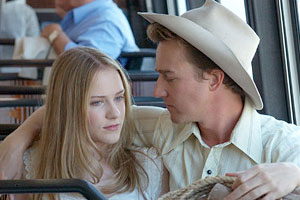In David Jacobson’s western elegy “Down in the Valley,” Edward Norton plays modern-day cowboy Harlan Fairfax Carruthers, a driftin’ tumbleweed who happens to have drifted into the San Fernando Valley. There he meets, by happenstance, a luscious suburban teenager played by Evan Rachel Wood. Her name is Tobe (that’s short for the unequivocally late-20th-century name “October”), and the two fall deeply in love, almost at first sight. Tobe, afflicted with girlish ennui and annoyed by her square, gun-loving corrections-officer dad (David Morse), has never seen anything like Harlan, and vice versa. Shortly after they meet, they go back to his rented room, where she straddles him hungrily. His face shows various blushing shades of bewildered pleasure, but his gentlemanly qualities quickly override his animal impulses. He tells Tobe that he wants to take her out on the town: “This is fine and all,” he says, “but it ain’t a proper way to meet.”
That encounter is part of the rough-hewn lyricism of the first half of “Down in the Valley.” The picture opens with a series of sun-dusted shots that gently nudge us into a particular time and place. We don’t yet know the exact location, but we sure get the mood: There are homey-looking bungalows, stubby palm trees, wide boulevards lined with nondescript chain restaurants and gas stations, semi-rural landscapes strung with power lines. This is the Southern California of now, a world with most of the wildness tamed out of it.
Harlan is the ghost of that long-lost wildness, an intentional anachronism who at first confuses, and then charms, Tobe with his pronouncements on the modern world. He doesn’t own a car because, he claims, he doesn’t like them: “They kinda make you lazy.” He demurs when Tobe and her friends offer him a joint: “Is it that wacky weed? I don’t touch any of that stuff.” As Norton plays him, Harlan is a gentle, soulful relic: When he picks Tobe up for their first date, he brings her a retro-looking dress that he’s bought for her; he butters up her dad (who’s understandably skeptical about this guy) by earnestly telling him what a “great spirit” his daughter has.
But if Harlan seems too good — or at least too weird — to be true, that’s because he is. And while Jacobson navigates the first half of “Down in the Valley” deftly, he loses his way in the second. (If you want to be completely surprised by the twists in “Down in the Valley,” you might want to stop reading now — although the movie is set up to clue us in to the fact that there will be twists, and it’s not too hard to guess what most of them are.)
Harlan is a symbol of isolation and dislocation; he’s completely lost, but he believes so wholeheartedly in the illusory self he’s crafted that we (and Tobe, as well as her little brother, played by Rory Culkin) can’t help believing in it, too. That’s partly because of the way Norton plays Harlan, vesting him with enough unvarnished innocence that we continue to like him even after we’ve cottoned to his delusion.
That eureka moment may occur when we see, fairly early in the movie, Harlan alone in his room, pointing a handgun at an imaginary enemy and reciting dialogue summoned straight from old-time westerns. Or it may be a little later, in the movie’s protracted “Taxi Driver” homage, when Harlan stands in front of his mirror — once again, with gun in hand — letting loose with a stuttering stream of crazy talk: He’s like Travis Bickle crossed with Andy Warhol’s silkscreen portrait of a gun-slinging Elvis, a man out of time who’s running out of time.
Jacobson — whose last picture was the 2002 “Dahmer” — clearly has an affinity for old-time (and newer) westerns that many younger moviegoers have never even seen, pictures like “Rio Bravo” and “The Wild Bunch.” If Harlan hasn’t seen those particular movies, he’s seen plenty like them. He’s quite a bit older than Tobe is — that’s part of what makes the movie’s sexual frankness feel somewhat daring — and still, he’s too young to have been the natural audience for these old westerns. And that’s part of his charm.
“Down in the Valley” is at its best when it’s channeling the lonely specters of those movies. But Jacobson is less adept at controlling the spiral of violence that this sort of story inevitably winds into. Dotted with multiple false climaxes, the last third of the picture drags along listlessly — by the end, we feel dusty and worn out, a little too tired to see Harlan for the romantic, tragic figure that he is. The California he’s dreaming of, the California of old-time ranchers and gold prospectors, is long gone, and that’s more than a little sad. But as the sun sinks slowly into the west, we’re relieved to be free of Harlan’s tortured vision: His nostalgic wistfulness has devolved into a stock landscape with one too many tumbleweeds blowing through it.

